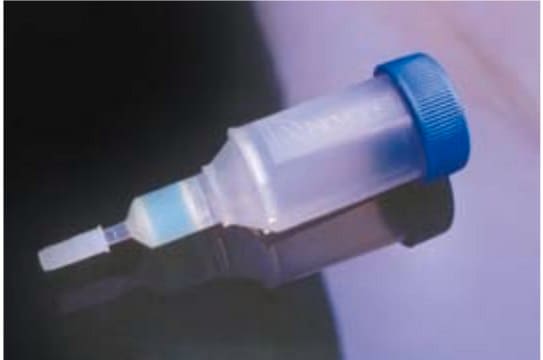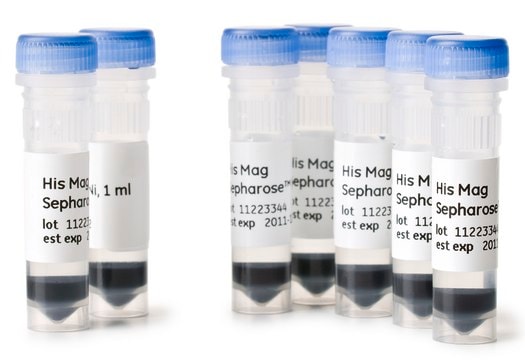H7787
HIS-Select® Spin Columns
Synonyme(s) :
His-Tag Spin Columns
Se connecterpour consulter vos tarifs contractuels et ceux de votre entreprise/organisme
About This Item
Code UNSPSC :
41106500
Nomenclature NACRES :
NA.56
Produits recommandés
Durée de conservation
2 yr at 2‑8 °C
Dimension de pores
100 nm pore size
Capacité
>0.5 mg/column
Température de stockage
2-8°C
Catégories apparentées
Description générale
Kit contains 3 collection tubes for every spin column.
Application
Pre-packed and ready-to-use HIS-Select Spin Columns allow for fast and consistent purification of small-scale crude cell extracts containing histidine-tagged proteins. The spin columns contain a matrix of silica particles and uses the HIS-Select patented non-charged, hydrophilic nickel chelating linkage chemistry. HIS-Select Spin Columns are highly selective for histidine-tagged proteins and exhibit very low non-specific binding of other proteins. These convenient Spin Columns allow for fast, one-step purification for the isolation of at least 150 μg of histidine-tagged protein in less than 15 minutes.
Caractéristiques et avantages
- High Selectivity for higher purity
- Convenient and Ready-to-Use
- Consistent protein binding each use
- Compatible with CelLytic™ cell lysis reagents
Informations légales
CelLytic is a trademark of Sigma-Aldrich Co. LLC
HIS-Select is a registered trademark of Merck KGaA, Darmstadt, Germany
Code de la classe de stockage
11 - Combustible Solids
Classe de danger pour l'eau (WGK)
WGK 3
Point d'éclair (°F)
Not applicable
Point d'éclair (°C)
Not applicable
Certificats d'analyse (COA)
Recherchez un Certificats d'analyse (COA) en saisissant le numéro de lot du produit. Les numéros de lot figurent sur l'étiquette du produit après les mots "Lot" ou "Batch".
Déjà en possession de ce produit ?
Retrouvez la documentation relative aux produits que vous avez récemment achetés dans la Bibliothèque de documents.
Les clients ont également consulté
Michael D BeGora et al.
The Journal of biological chemistry, 285(38), 29147-29155 (2010-07-24)
Three sequential methylations of phosphoethanolamine (PEA) are required for the synthesis of phosphocholine (PCho) in plants. A cDNA encoding an N-methyltransferase that catalyzes the last two methylation steps was cloned from Arabidopsis by heterologous complementation of a Saccharomyces cerevisiae cho2
Ozan Gundogdu et al.
Journal of bacteriology, 193(16), 4238-4249 (2011-06-07)
Campylobacter jejuni is the leading bacterial cause of human gastroenteritis worldwide. Despite stringent microaerobic growth requirements, C. jejuni is ubiquitous in the aerobic environment and so must possess regulatory systems to sense and adapt to external stimuli, such as oxidative
Anne Durand et al.
The Journal of biological chemistry, 281(40), 29558-29567 (2006-07-26)
In Escherichia coli, the ammonia channel AmtB and the P(II) signal transduction protein GlnK constitute an ammonium sensory system that effectively couples the intracellular nitrogen regulation system to external changes in ammonium availability. Binding of GlnK to AmtB apparently inactivates
Dirk Maass et al.
PloS one, 4(7), e6373-e6373 (2009-07-29)
As the first pathway-specific enzyme in carotenoid biosynthesis, phytoene synthase (PSY) is a prime regulatory target. This includes a number of biotechnological approaches that have successfully increased the carotenoid content in agronomically relevant non-green plant tissues through tissue-specific PSY overexpression.
Maria A Schumacher et al.
Nucleic acids research, 46(14), 7405-7417 (2018-06-16)
Streptomyces are filamentous bacteria with a complex developmental life cycle characterized by the formation of spore-forming aerial hyphae. Transcription of the chaplin and rodlin genes, which are essential for aerial hyphae production, is directed by the extracytoplasmic function (ECF) σ
Notre équipe de scientifiques dispose d'une expérience dans tous les secteurs de la recherche, notamment en sciences de la vie, science des matériaux, synthèse chimique, chromatographie, analyse et dans de nombreux autres domaines..
Contacter notre Service technique








